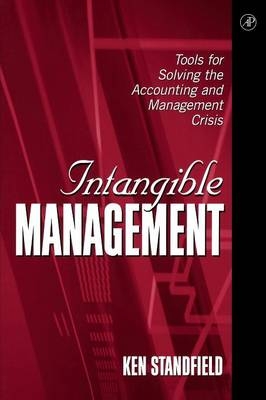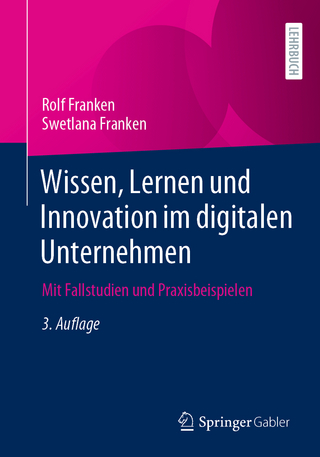
Intangible Management
Tools for Solving the Accounting and Management Crisis
Seiten
2002
Academic Press Inc (Verlag)
978-0-12-663351-1 (ISBN)
Academic Press Inc (Verlag)
978-0-12-663351-1 (ISBN)
- Keine Verlagsinformationen verfügbar
- Artikel merken
Investigates the ways that intangible values can be identified, measured, and managed. By using case studies, and a set of accounting tools, this work demonstrates how a new value framework can protect investors while giving companies the ability to generate long-term growth.
For the recorded history of management, the world has managed value creation according to what can be seen, touched and proven. In today's knowledge-based economy, value creation is derived primarily from how well firms manage intangibles (knowledge, service, expectations, response time, innovation, change management, etc). The large capital outlays that signified the manufacturing economy are no longer required. In fact, such 'tangibles' now explain less than 20% of the value of most publicly listed firms. For example, Time Warner has only 6.49% of its value attributable to tangibles. As such, for every $1 of true value, only $0.065 cents is being measured and managed by conventional management practices. For Oracle Corporation, tangibles account for only 4% of its value. For General Electric (worth over US$450 billion), tangibles account for less than 11% of its value.
Intention, context, emotional intelligence, escalation, and sustainability are words that are generally absent from the operational management techniques of managers worldwide. They form, however, the basis of skills required to manage organizations in today's knowledge-based economy. The authors investigate the ways that intangible values can be identified, measured, and managed. Their revolutionary and innovative taxonomy not only reveals fundamental differences between a manufacturing economy and one which creates value through knowledge, relationships, and time. By using case studies, a compelling mixture of theory and applications, and a set of accounting tools, the authors demonstrates how a new value framework can protect investors while giving companies the ability to generate long-term growth.
For the recorded history of management, the world has managed value creation according to what can be seen, touched and proven. In today's knowledge-based economy, value creation is derived primarily from how well firms manage intangibles (knowledge, service, expectations, response time, innovation, change management, etc). The large capital outlays that signified the manufacturing economy are no longer required. In fact, such 'tangibles' now explain less than 20% of the value of most publicly listed firms. For example, Time Warner has only 6.49% of its value attributable to tangibles. As such, for every $1 of true value, only $0.065 cents is being measured and managed by conventional management practices. For Oracle Corporation, tangibles account for only 4% of its value. For General Electric (worth over US$450 billion), tangibles account for less than 11% of its value.
Intention, context, emotional intelligence, escalation, and sustainability are words that are generally absent from the operational management techniques of managers worldwide. They form, however, the basis of skills required to manage organizations in today's knowledge-based economy. The authors investigate the ways that intangible values can be identified, measured, and managed. Their revolutionary and innovative taxonomy not only reveals fundamental differences between a manufacturing economy and one which creates value through knowledge, relationships, and time. By using case studies, a compelling mixture of theory and applications, and a set of accounting tools, the authors demonstrates how a new value framework can protect investors while giving companies the ability to generate long-term growth.
Introduction
The Failings of Conventional Management
What Knowledge Managers Need to Know
Intangible Operating Structures
The Asset vs. Expense Debate
Intangible Bookkeeping and Intangible Accounting
Intangible Bookkeeping
Foundations of Intangible Management
Intangible Cost Management
Emotion and Time Studies
Identifying Non-Productive Time
Knowledge Application Costs
Intangible Information Management
IIS21001 Knowledge Reengineering Standard
Examples of IIS21001 Knowledge Reengineering
Intangible Cost Structures
The Traditional Economic Approach to Measuring Economic Profit
| Erscheint lt. Verlag | 30.7.2002 |
|---|---|
| Verlagsort | San Diego |
| Sprache | englisch |
| Maße | 152 x 229 mm |
| Gewicht | 390 g |
| Themenwelt | Wirtschaft ► Betriebswirtschaft / Management ► Unternehmensführung / Management |
| ISBN-10 | 0-12-663351-7 / 0126633517 |
| ISBN-13 | 978-0-12-663351-1 / 9780126633511 |
| Zustand | Neuware |
| Haben Sie eine Frage zum Produkt? |
Mehr entdecken
aus dem Bereich
aus dem Bereich
wie man Menschen wirklich weiterbringt
Buch | Softcover (2024)
Vahlen (Verlag)
CHF 37,65
Buch | Softcover (2023)
Springer Gabler (Verlag)
CHF 46,15
ein Navigationssystem für Führungskräfte
Buch (2023)
Carl-Auer Verlag
CHF 48,90


